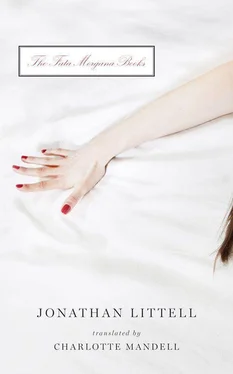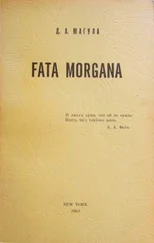* * *
At dinner, it was more of the same. The children shrieked, guffawed, giggled, spilled their glasses on the table, wiped their mouths with their sleeves or rubbed oily fingers on their pants, the women scolded them, wiped them off, then served them more, all in a continuous racket of cutlery, dishes, and noisy chewing. If I wanted some wine, I had to wait for someone to serve another person to try to catch a few drops in passing, my glass stretched across the table; to eat, I pricked the tip of my fork haphazardly into neighboring plates, a green bean here, a piece of meat there, no one seemed to notice. From time to time, taking advantage of a brief pause in the conversation, I timidly hazarded a sentence, but it went unnoticed, the flow of words and shouts continued ceaselessly.The children got up with a loud scraping of chairs, went off to play, then came back to eat standing up before they were made to sit down; they drank while letting juice dribble down onto their chins and shirts, dug their hands into their plate to throw unwanted pieces into their neighbor’s plate, then leapt up again to return to their games, deaf to any orders. For dessert, everyone rushed to the living room with his piece of cake; overwhelmed, I quickly swallowed some leftovers abandoned on the plates as the table was cleared around me. In the living room, visitors were arriving; they were served drinks and cigarillos as they struck up conversation interlaced with pleasantries and flatteries; I looked for a chair, so I could at least sit down and listen, but in vain, none was free; it seemed better to withdraw. I found myself in a large, completely white and blue bathroom; three little girls were splashing about and laughing in a great bathtub filled with bubbles, but as I tried to pass by, they began squealing and waving their arms, sending huge sprays of water through the room that forced me to step back to keep from getting soaked. The blond child was playing the piano in another room, a simple little nursery rhyme whose notes he picked out as he marked time under his breath. I wanted to reach out and play a few notes with him; without noticing me, he slammed the lid down on my fingers and rushed out in a noisy clatter of footsteps. I opened the piano and tried to sketch out the beginning of a piece, but my swollen hands no longer remembered the fingerings. Above the piano, the portrait of an old, noble-looking and somewhat bitter man contemplated me with an air of reproach, his lips pinched as if to let me know I had no place here. Fatigue overwhelmed me, I decided to go to bed; but I didn’t know where to sleep: I visited several bedrooms, all equally clean and handsome, and finally chose one at random. I got undressed at the foot of the bed, carefully folding my clothes, which I arranged on a chair; as I slipped under the sheets, I glimpsed the reflection of my body in the large round mirror hanging opposite the bed, a white body, seemingly in good shape, but as if completely foreign to me. I put out the light and stretched out on my side, one hand under my cheek, the other pressed against my chest. But I couldn’t manage to find sleep. Through the wooden door more children’s shouts resounded, the noise of footsteps, bursts of voices. They seemed to come from all sides of the house, moved from one place to the other, grew distant, then returned all at once to swoop down on me. Merriment had turned into anger, I heard weeping, curt, gruff phrases, but didn’t know what they were about. Things calmed down, then started up again; finally the voices grew brighter, more cheerful. A woman laughed in fits and starts, a man joined in, the children too laughed calmly in another part of the house. A little later on — I still wasn’t sleeping — the door opened and a bright light streamed from the chandelier on the ceiling. I squeezed my eyes shut and burrowed into the pillow. Nearby, someone was getting undressed; I heard the rustle of cloth, then the sound of a brush being pulled through long hair. Finally the person slid into the bed next to me and, turning its back to me, switched the light off. From her smell, I understood it was a woman; her body, warm and soft, surrendered itself quickly to sleep, her breathing became even, then filled with a very slight snore. Annoyed, I turned onto my back and opened my eyes. Little by little, they grew used to the darkness; shifting them to the side, I could just make out the curve of the sheet, drawn over the woman’s shoulder, and the dark mass of her hair. Once again, I looked at the ceiling, examining in the penumbra the long oak beams and the chandelier, whose cut glass facets on yellow brass branches caught vague luminous reflections. The woman next to me slept without moving; the sheets rose and fell to the regular rhythm of her breathing. But sleep continued to elude me, my anxious thoughts refused to grant it to me. When finally I saw the sky grow pale behind the window, I rose soundlessly and dressed in the half-light. The woman had turned onto her back; I could make out her arm under the sheet stretched out across her belly, her hand nestled between her legs. I went out and gently closed the door. I soon got lost in the disorder of the rooms: in one, four children were sleeping in bunk beds, their little heads barely protruding from the sheets and the piles of stuffed animals; in another, an old woman was snoring, tucked in a narrow iron bed pushed against the wall; even further on, there was a couple, the head of the woman nestled in the hollow of the man’s shoulder, the embroidered sheet thrown back, revealing a white breast with a large pink areola, milky against the darker chest on which it rested. In the hallways, already lit by daylight, dusty paintings stood out from the darkness, outlining little rectangles of color on the walls covered with eggshell, pale green and off-white cloth, enhanced by brown or gold. Finally I found the way out and slipped through the door, which I closed carefully on the sleeping house, taking care not to disturb anyone.
* * *
The gate locked behind me with a gentle click and I emerged into the pale dawn. The road was wet from the streetcleaners’ trucks; along the sidewalk, the still-hesitant leaves of the plane trees masked a whitening sky streaked with yellow and orange glints. I walked with a carefree step, examining with a burst of pleasure the cement of the sidewalk, applied in grand, sweeping strokes, as if with a paintbrush, then broadening my gaze to take in the greys of the pavement, the façades of the houses and the vanilla-marbled trunks of the plane trees, the absinthe-green of the leaves in the glow of early morning, the coral red, navy blue, canary yellow, or white of the parked cars. When I reached the building, I inserted my flat key into the lock high up in the heavy wooden door, and leaned on it with all my strength to push it open and penetrate the narrow entrance hall. Already I felt more vigorous: I was regaining solidity, my body was finding its forms and limits and was once again occupying space. In front of me stood the door, painted olive green, of an always absent neighbor; to my right, the lavender-colored stairway, covered in a worn old red plush carpet fixed to the steps by small brass bars, led to the landing where my doors were. There, I hesitated between the one on the left, painted black, and the one on the right, a cardinal red; but my reinvigorated body was reminding me of its own demands, and I made an about-face and went back out into the street, in search of an open café. A little further up there was a small square lined with plane trees; a waiter in a black vest with gold stripes was setting out onto the sidewalk some round greenish marble tables and little straw-colored wicker chairs, woven with red and black, two of which were already occupied by men in dark coats. One of them was reading the paper, whose headline, of which I could see only half, mentioned a country known for its hostility to us; the other suddenly raised his head: under the brim of his soft hat, tinted, tortoise-shell glasses masked his gaze. I entered the café as the waiter was placing two small white cups in front of them, and ordered a coffee and some buttered toast, which I ate slowly at the counter before having another coffee and smoking a cigarette, happily enjoying the rediscovered feeling of my body.
Читать дальше











